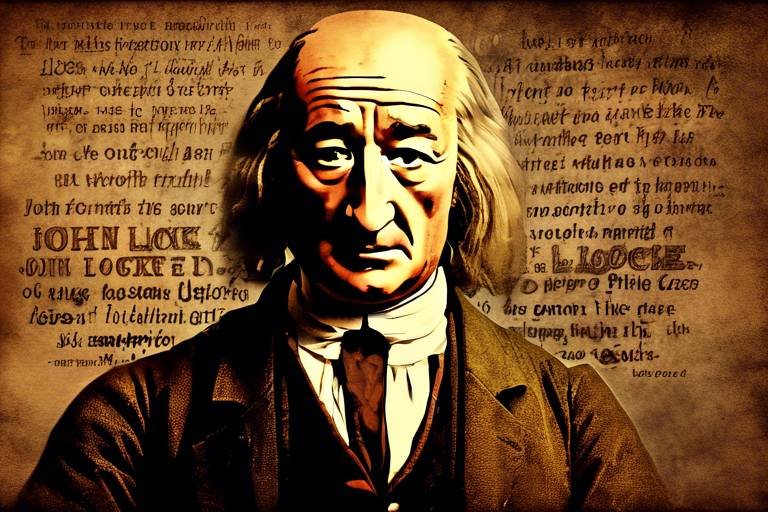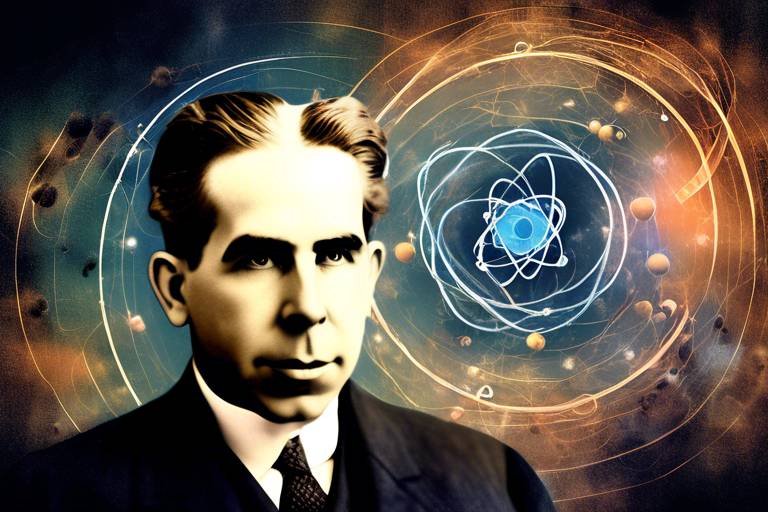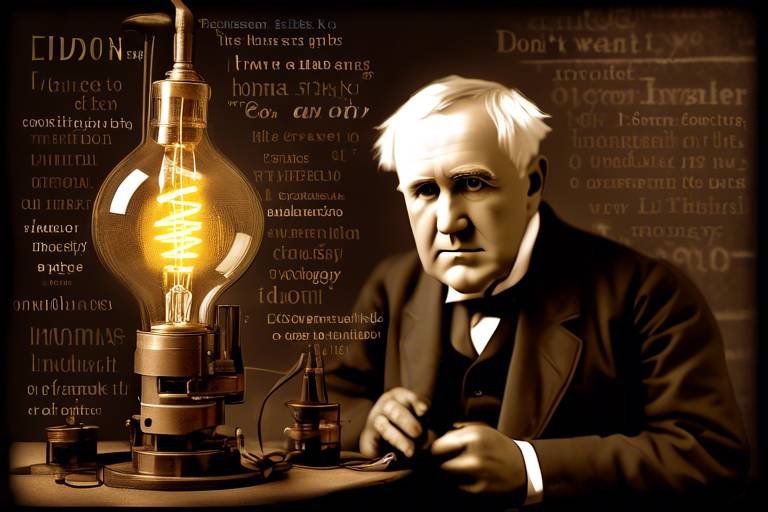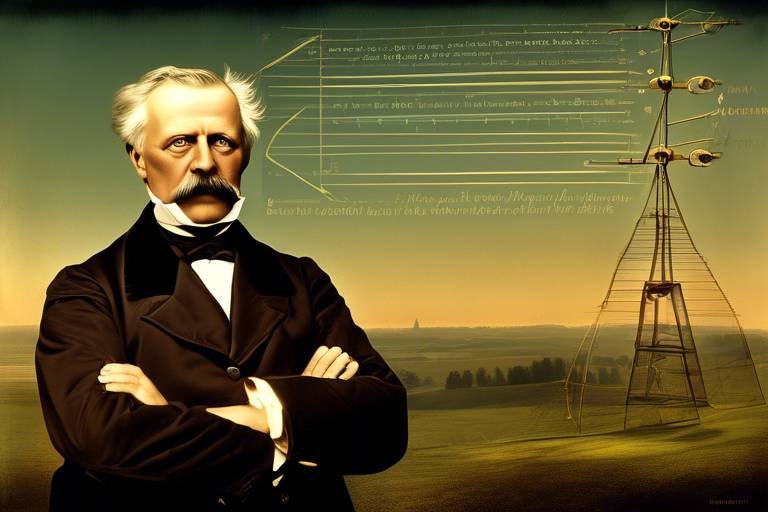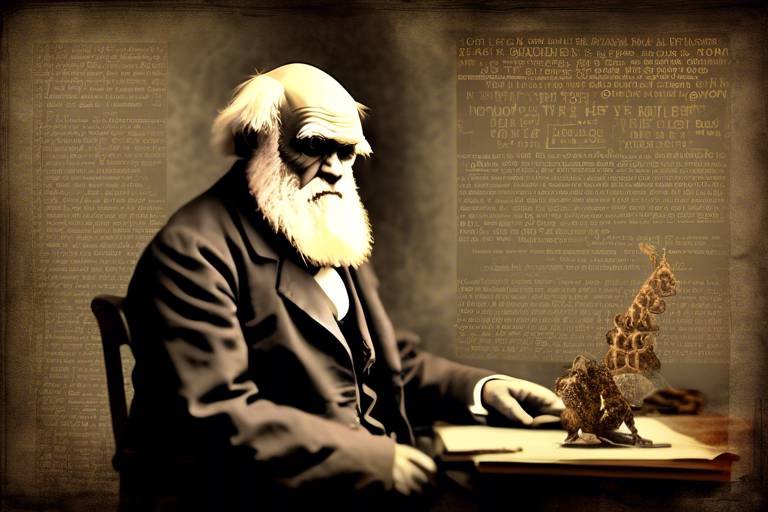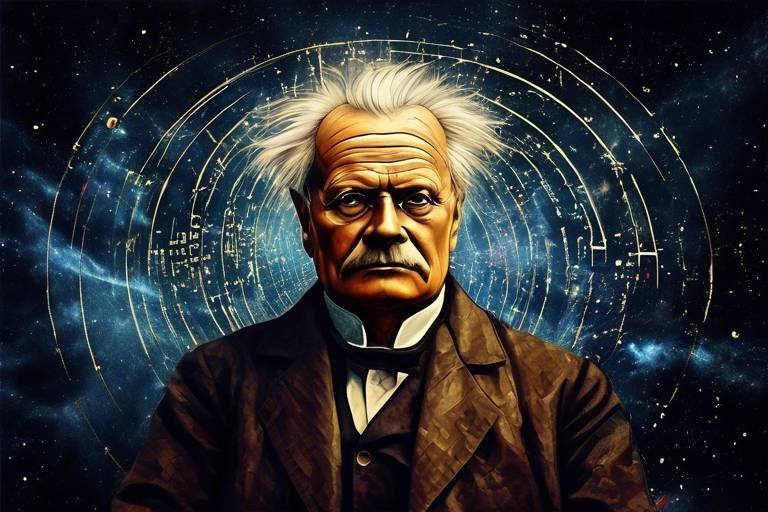The Work of John Locke and Empiricism
John Locke, a towering figure in the realm of philosophy, has left an indelible mark on our understanding of knowledge and the human mind. Born in 1632, Locke's ideas emerged during a time of significant intellectual upheaval, which laid the groundwork for modern thought. His contributions, particularly in the realm of empiricism, emphasize the profound impact of experience on human understanding. In a world where knowledge is often taken for granted, Locke's insistence that our minds begin as a tabula rasa or blank slate challenges us to consider how we acquire knowledge and shape our beliefs. This article will delve into Locke's philosophical principles, the essence of empiricism, and its lasting influence on contemporary thought and education.
At the heart of Locke's philosophy lies the assertion that knowledge is not innate but rather acquired through experience. He argued that the human mind, at birth, is a blank slate, devoid of any preconceived notions or ideas. This revolutionary perspective shifted the focus from the rationalist belief in innate ideas to a more experiential understanding of knowledge. Locke posited that our senses are the primary means through which we gather information about the world around us. This sensory experience forms the basis of our understanding, leading to the formation of ideas and concepts. In essence, Locke believed that all our knowledge is derived from what we perceive through our senses, making experience the cornerstone of human understanding.
Empiricism, as defined by Locke, is a philosophical doctrine that emphasizes the role of sensory experience in the formation of ideas. Unlike rationalism, which posits that knowledge can be derived from reason alone, empiricism insists that knowledge must be grounded in observable phenomena. This approach encourages a more scientific method of inquiry, where hypotheses are tested against real-world observations. Locke's empiricism laid the foundation for modern scientific exploration, as it promotes the idea that knowledge is not static but rather evolves through continuous observation and experimentation. In a way, empiricism can be likened to a detective solving a mystery; the detective gathers clues (sensory experiences) to piece together the truth.
To fully appreciate the significance of Locke's work, it is essential to understand the historical context in which he wrote. The Enlightenment, a period characterized by a surge in intellectual and philosophical advancements, provided the backdrop for Locke's ideas. During this time, thinkers began to challenge traditional notions of authority and knowledge, advocating for reason and empirical evidence as the basis for understanding the world. Locke was not alone in this endeavor; he was part of a broader movement that included other key figures who championed empiricism. This collective shift in thinking paved the way for modern philosophy, science, and education.
Locke's ideas were significantly influenced by earlier philosophers, notably Francis Bacon and David Hume. Bacon, often regarded as the father of the scientific method, emphasized the importance of observation and experimentation in acquiring knowledge. His work laid the groundwork for Locke's empirical approach, which sought to understand the world through tangible experiences. Hume, on the other hand, expanded on Locke's ideas by questioning the nature of causality and human understanding. Together, these thinkers created a rich tapestry of thought that shaped Locke's philosophical framework and contributed to the broader empiricist tradition.
One of Locke's most famous concepts is that of the tabula rasa, or blank slate. This metaphor illustrates his belief that individuals are born without innate ideas, and that all knowledge comes from experience. Imagine a blank canvas waiting to be painted upon; each experience adds color and depth to our understanding of the world. This notion challenges the idea of pre-existing knowledge and emphasizes the importance of education and experience in shaping our beliefs and values. Locke's tabula rasa has profound implications for education, suggesting that a nurturing environment can foster critical thinking and creativity.
Locke's influence extends far beyond his time, shaping contemporary philosophical thought, particularly in the fields of epistemology and political theory. His ideas on the nature of knowledge have informed modern educational practices, encouraging a focus on experiential learning rather than rote memorization. Additionally, Locke's political philosophy, which emphasizes individual rights and the social contract, laid the groundwork for modern democratic principles. His belief that governments derive their authority from the consent of the governed resonates in today's discussions on human rights and governance.
Despite his significant contributions, Locke's empiricism has faced various critiques over the years. Later philosophers, such as Immanuel Kant, challenged Locke's ideas by arguing that while experience is crucial, it is not the sole source of knowledge. Kant posited that our understanding of the world is also shaped by innate structures of the mind, suggesting a more complex interplay between experience and reason. These critiques have spurred ongoing debates in philosophy, prompting further exploration of the nature of knowledge and understanding.
In response to these critiques, many scholars have sought to defend Locke's empiricism by emphasizing its practical applications and relevance in contemporary discussions. While some argue that innate ideas may exist, others maintain that Locke's focus on experience remains a vital aspect of human understanding. This ongoing dialogue highlights the adaptability of Locke's ideas, showcasing how they can evolve in response to new philosophical inquiries.
Today, Locke's ideas continue to resonate in various fields, from education to science. His emphasis on experiential learning has transformed educational practices, advocating for hands-on experiences that foster critical thinking. Additionally, Locke's insights into the nature of knowledge encourage a scientific approach to inquiry, promoting a culture of curiosity and exploration. As we navigate an increasingly complex world, Locke's contributions remind us of the importance of grounding our understanding in experience and observation.
- What is empiricism? Empiricism is a philosophical doctrine that asserts that knowledge comes primarily from sensory experience.
- What does tabula rasa mean? Tabula rasa, or blank slate, refers to the idea that individuals are born without innate ideas, and that knowledge is acquired through experience.
- How did Locke influence modern philosophy? Locke's ideas on knowledge and political theory laid the groundwork for modern democratic principles and educational practices focused on experiential learning.
- What are some critiques of Locke's empiricism? Critics like Immanuel Kant argue that while experience is important, innate structures of the mind also play a role in shaping knowledge.

John Locke's Philosophy
John Locke, often hailed as one of the most influential thinkers of the Enlightenment, revolutionized the way we perceive knowledge and the human mind. His philosophy is grounded in the belief that experience is the cornerstone of understanding. Unlike his predecessors, who posited that certain ideas were innate, Locke argued that the mind at birth is a tabula rasa, or blank slate, waiting to be filled with experiences. This radical notion shifted the focus from inherent knowledge to the significance of sensory experiences in shaping our understanding of the world.
Locke's exploration of knowledge can be divided into two primary categories: sensation and reflection. Sensation refers to the direct experiences we gather through our senses—sight, sound, touch, taste, and smell. Reflection, on the other hand, involves the internal processes of the mind as it contemplates and analyzes these sensory experiences. Together, these processes form the foundation of human knowledge, suggesting that our understanding is not merely a product of innate ideas but rather a complex interplay of external stimuli and internal cognition.
Moreover, Locke emphasized the importance of empirical evidence in forming beliefs and knowledge. He argued that knowledge must be based on observable phenomena and that conclusions should be drawn from what can be seen, heard, or experienced. This empirical approach laid the groundwork for the scientific method, advocating that all knowledge should be tested and verified through experience. In this sense, Locke's philosophy can be seen as a bridge between medieval scholasticism and modern scientific inquiry.
Locke's ideas also extended to the realms of politics and ethics. He believed that individuals possess natural rights to life, liberty, and property, which are essential for a just society. His social contract theory posited that governments are formed to protect these rights and that their legitimacy derives from the consent of the governed. This notion not only influenced contemporary political thought but also served as a catalyst for revolutions, including the American and French Revolutions.
In summary, Locke's philosophy is characterized by its emphasis on experience as the source of knowledge, the importance of empirical evidence, and the foundational principles of individual rights and government accountability. His work has left a profound legacy, shaping modern thought in philosophy, science, and politics. As we delve deeper into the concept of empiricism, it becomes evident that Locke's contributions are not merely historical; they continue to resonate in our understanding of human cognition and societal structure.

Empiricism Defined
Empiricism is a philosophical theory that asserts that knowledge comes primarily from sensory experience. In simpler terms, it suggests that what we know about the world is shaped by what we can see, hear, touch, taste, and smell. Imagine trying to learn about a new city; you wouldn’t just read about it in a book or listen to someone describe it. Instead, you would explore its streets, savor its food, and feel its atmosphere. This experiential learning is at the heart of empiricism, making it a cornerstone of scientific inquiry and everyday understanding.
At its core, empiricism stands in contrast to rationalism, which posits that reason and innate ideas are the primary sources of knowledge. While rationalists might argue that we can deduce truths about the world through logical reasoning alone, empiricists contend that without experience, such reasoning is hollow. This debate between empiricism and rationalism has shaped much of modern philosophy, influencing everything from the scientific method to educational practices.
To better understand empiricism, let’s break down its foundational principles:
- Experience as the Source of Knowledge: Empiricists believe that all knowledge originates from sensory experiences. For example, you know fire is hot because you've felt its heat.
- Inductive Reasoning: This method involves drawing general conclusions from specific observations. For instance, if you see the sun rise every morning, you might conclude that the sun will rise again tomorrow.
- Rejection of Innate Ideas: Unlike rationalists, empiricists argue that humans are not born with pre-existing knowledge. Instead, our minds are like blank slates, or tabula rasa, waiting to be filled with experiences.
The implications of empiricism extend beyond philosophy; they influence various fields, including science, psychology, and education. In science, for instance, the empirical method encourages researchers to rely on observation and experimentation rather than speculation. This reliance on data helps ensure that conclusions are grounded in reality, making scientific claims more robust and reliable.
Moreover, in the realm of education, empiricism emphasizes the importance of experiential learning. Rather than merely memorizing facts, students are encouraged to engage with material through hands-on activities and real-world applications. This approach not only makes learning more engaging but also fosters a deeper understanding of the subject matter.
In summary, empiricism is a vital philosophical approach that prioritizes experience as the foundation of knowledge. By contrasting it with rationalism, we see how it has shaped our understanding of the world, influencing various domains from science to education. As we continue to explore the works of John Locke and his contributions to this philosophy, we can appreciate the profound impact empiricism has had on modern thought.

Historical Context
The journey of empiricism is deeply intertwined with the rich historical tapestry of the Enlightenment, a period that sparked revolutionary ideas and challenged the status quo of thought. During the 17th century, Europe was undergoing significant transformations. The rise of science and the questioning of traditional authority were at the forefront of intellectual discourse. It was in this vibrant atmosphere that John Locke emerged as a pivotal figure, advocating for a philosophy that emphasized observation and experience as the foundation of knowledge.
Locke's ideas did not arise in a vacuum; they were influenced by the works of earlier thinkers who laid the groundwork for empirical thought. Notably, Francis Bacon championed the scientific method, advocating for a systematic approach to experimentation and observation. His insistence on gathering data through sensory experience resonated with Locke, who later expanded on these ideas. Bacon's notion that knowledge should be acquired through the natural world rather than through abstract reasoning became a cornerstone of Locke's philosophy.
Additionally, the philosophical landscape was shaped by the contributions of David Hume, another key figure in the empiricist tradition. Hume's skepticism regarding human understanding and his exploration of causation and perception provided a critical lens through which Locke's ideas could be examined. While Locke focused on the acquisition of knowledge through experience, Hume took it a step further by questioning the very nature of that knowledge and how it could be justified.
To fully grasp the significance of Locke's contributions, one must consider the broader context of the Enlightenment, characterized by:
- Intellectual Freedom: A shift away from dogmatic beliefs towards inquiry and reason.
- Scientific Revolution: Advancements in science that challenged established views of the universe.
- Political Change: The questioning of monarchies and the rise of democratic ideals.
Locke's work was revolutionary not just in philosophy but also in its implications for politics and education. His ideas on the mind as a tabula rasa, or blank slate, suggested that individuals are not born with innate knowledge but rather acquire it through experience. This was a radical departure from the prevailing notions of the time, which often emphasized inherent qualities or divine insight as sources of knowledge.
As we delve deeper into Locke's philosophy, it becomes clear that his impact was not limited to his own era. His ideas laid the groundwork for modern empirical research and educational practices, influencing thinkers and systems long after his time. The historical context of Locke's work is essential to understanding the evolution of empiricism and its lasting legacy in contemporary thought.

Influence of Bacon and Hume
When we talk about the evolution of empiricism, it’s impossible to overlook the significant contributions of two intellectual giants: Francis Bacon and David Hume. These thinkers laid the groundwork for empiricism, influencing John Locke and shaping the landscape of modern philosophy. Bacon, often referred to as the father of the scientific method, championed the idea that knowledge should be derived from empirical evidence gathered through observation and experimentation. His belief that humans should rely on their senses to understand the world around them was revolutionary. Imagine a world where knowledge was solely based on abstract reasoning—Bacon's insistence on experiment and observation was like opening a window to fresh air, allowing new ideas to flow in.
On the other hand, we have David Hume, who took empiricism a step further. Hume argued that all human knowledge arises from sensory experiences, emphasizing that our understanding of reality is built upon what we perceive. In his work, he famously stated, “All the perceptions of the mind resolve themselves into two distinct kinds, which I shall call impressions and ideas.” This distinction is crucial, as it highlights the process by which we form concepts and beliefs based on our experiences. Hume's skepticism about causation and his assertion that we can never truly know the cause of an event, only its correlation, challenged the established norms of philosophical thought.
The interplay between Bacon's and Hume's ideas significantly impacted Locke's philosophy. Locke adopted Bacon's empirical approach, advocating for the importance of experience in the acquisition of knowledge. He viewed the human mind as a tabula rasa, or blank slate, which is filled through sensory experiences. This idea was revolutionary at the time, as it suggested that individuals are not born with innate ideas but rather develop their understanding of the world through interaction with it. In a sense, Locke's philosophy can be seen as a bridge between Bacon's empirical techniques and Hume's skeptical inquiry.
To illustrate the influence of these thinkers on Locke, consider the following table that summarizes their key contributions:
| Philosopher | Key Contribution | Impact on Locke |
|---|---|---|
| Francis Bacon | Emphasis on empirical evidence and the scientific method | Encouraged Locke to prioritize experience in knowledge acquisition |
| David Hume | Distinction between impressions and ideas; skepticism about causation | Influenced Locke's views on the nature of knowledge and experience |
In conclusion, the influence of Bacon and Hume on Locke's ideas cannot be overstated. Their emphasis on experience as the foundation of knowledge transformed the philosophical landscape and paved the way for modern empiricism. Understanding their contributions helps us appreciate the intricate web of ideas that shaped Locke's thought and, ultimately, our contemporary understanding of knowledge itself.

Locke’s Tabula Rasa
John Locke's concept of tabula rasa, which translates to "blank slate," is a cornerstone of his empirical philosophy. Imagine starting with a clean canvas, where every experience, interaction, and observation paints a unique picture of understanding. Locke proposed that the human mind is like this blank slate at birth, devoid of any innate ideas or knowledge. Instead, he argued that all knowledge is acquired through experience, primarily through our senses. This radical idea challenged the prevailing notions of his time, suggesting that we are not born with pre-existing concepts or truths, but instead, we build our understanding of the world from the ground up.
Locke believed that our experiences can be categorized into two types: sensation and reflection. Sensation refers to the information we gather from our external environment through our senses—sight, sound, touch, taste, and smell. Reflection, on the other hand, involves the internal processes of the mind, where we think about our sensations and the ideas they produce. These two processes work together to form a comprehensive understanding of our surroundings. For instance, when you see a tree (sensation) and then think about its color, shape, and the idea of "tree" itself (reflection), you are actively engaging in the process of knowledge acquisition.
Locke’s emphasis on experience as the foundation of knowledge has profound implications for education and personal development. It suggests that learning is not merely about memorizing facts but rather about engaging with the world, questioning, and reflecting on our experiences. This perspective encourages a more hands-on approach to education, where students are invited to explore, experiment, and draw conclusions based on their observations. In this sense, Locke’s ideas resonate strongly with modern educational philosophies that prioritize experiential learning.
However, it’s essential to recognize that Locke’s tabula rasa has sparked significant debate among philosophers. Critics argue that some knowledge might be innate, challenging the idea that we start as a blank slate. For instance, certain reflexes and instincts can be seen as pre-existing knowledge that influences our behavior and understanding from birth. Nevertheless, Locke's tabula rasa remains a powerful framework for understanding human development and the acquisition of knowledge, emphasizing the importance of experience and the active role of the learner in shaping their understanding.
In summary, Locke's concept of tabula rasa not only reshaped philosophical discourse but also laid the groundwork for modern educational practices. By viewing the mind as a blank slate, Locke invited future generations to explore the depths of human understanding through experience and reflection, making his ideas as relevant today as they were in the 17th century.
- What does tabula rasa mean? Tabula rasa is a Latin term meaning "blank slate," referring to the idea that individuals are born without built-in mental content and that knowledge comes from experience.
- How does Locke's tabula rasa relate to education? Locke's idea emphasizes the importance of experiential learning, suggesting that education should focus on engaging students through experiences rather than rote memorization.
- What are the criticisms of Locke's tabula rasa? Critics argue that some knowledge may be innate, suggesting that not all understanding comes purely from experience. This has led to debates about the nature of knowledge and learning.

tabula rasa
This article explores John Locke's contributions to philosophy, particularly his ideas on empiricism, knowledge, and the human mind, emphasizing their lasting impact on modern thought and education.
An overview of John Locke's philosophical principles, including his views on the nature of knowledge, the mind, and the importance of experience in shaping human understanding.
This section delves into the concept of empiricism, explaining its foundational principles and how it contrasts with rationalism in the quest for knowledge.
Understanding the historical background of empiricism, including its emergence during the Enlightenment and its key proponents besides Locke, provides insight into its development.
Examining the contributions of Francis Bacon and David Hume helps contextualize Locke's work within the broader empiricist tradition and highlights their interconnected ideas.
Locke's concept of the mind as a or blank slate is crucial to his empirical philosophy, emphasizing the role of experience in knowledge acquisition. Imagine a fresh canvas waiting for the artist's brush; this is how Locke viewed the human mind at birth. He argued that we are not born with innate ideas or knowledge; instead, our understanding is shaped by our experiences, interactions, and sensory perceptions. This revolutionary idea challenged the prevailing notions of the time, which suggested that certain truths were inherent within us from birth.
In Locke's view, our experiences can be categorized into two types:
- Sensations: These are the direct inputs we receive from the world around us through our senses—sight, sound, touch, taste, and smell.
- Reflections: These are the thoughts and ideas that arise from processing our sensations and experiences, allowing us to form complex ideas and concepts.
Locke believed that through these processes, we gradually build our understanding of the world. The implications of this idea are profound, as it places the responsibility of knowledge acquisition squarely on the shoulders of individual experience. This notion not only laid the groundwork for modern educational theories but also paved the way for a more democratic view of knowledge, where everyone, regardless of their background, has the potential to learn and grow.
This section assesses Locke's influence on contemporary philosophical thought, particularly in epistemology and political theory, showcasing his enduring relevance.
Here we explore various critiques of Locke's empiricism, discussing challenges posed by later philosophers and how these critiques shaped subsequent philosophical discourse.
Analyzing how Locke's ideas were defended or adapted in response to critiques offers a deeper understanding of his philosophical legacy and its evolution.
This final section considers how Locke's ideas continue to resonate in modern discussions on education, science, and the nature of human understanding.
"Tabula rasa" is a Latin term that translates to "blank slate," representing the idea that individuals are born without built-in mental content and that all knowledge comes from experience and perception.
Locke's emphasis on experience as the foundation of knowledge has significantly influenced modern educational practices, promoting experiential learning and critical thinking over rote memorization.
Yes, some philosophers argue against the idea of a completely blank slate, suggesting that certain innate ideas or predispositions may exist, which could influence how we perceive and understand the world.

or blank slate is crucial to his empirical philosophy, emphasizing the role of experience in knowledge acquisition.
John Locke's concept of tabula rasa, which translates to "blank slate," is a cornerstone of his empirical philosophy. Imagine starting with a canvas that has never been painted on; this is how Locke envisioned the human mind at birth. He argued that we are not born with innate ideas or preconceived notions. Instead, our understanding of the world is shaped entirely by our experiences. This idea was revolutionary, especially in a time when many believed that certain truths were inherent to human nature.
Locke proposed that knowledge is acquired through two primary sources: sensation and reflection. Sensation refers to the information we gather from our senses—what we see, hear, touch, taste, and smell. Reflection, on the other hand, is the process of thinking about those sensations. Together, these experiences form the basis of our knowledge. To illustrate this, consider how a child learns about a dog. Initially, the child may see a dog (sensation) and then think about its characteristics, such as its bark, fur, and behavior (reflection). Through repeated encounters and reflections, the child builds a comprehensive understanding of what a dog is.
Locke’s emphasis on experience as the foundation of knowledge has profound implications. It suggests that education and learning are not just about memorizing facts but about engaging with the world. This perspective encourages a more hands-on, experiential approach to education, where learners are active participants in their knowledge acquisition. In modern educational settings, this idea can be seen in practices such as project-based learning and experiential education, where students learn through real-world experiences rather than passive absorption of information.
Furthermore, Locke’s idea of tabula rasa challenges the notion of predetermined destiny. If we are all born as blank slates, it follows that our experiences shape who we become. This democratizes knowledge and understanding, suggesting that anyone can learn and grow, regardless of their background. It aligns with the modern belief in the potential for personal development and the transformative power of education.
In summary, Locke's concept of the mind as a tabula rasa is crucial to understanding his empirical philosophy. It underscores the importance of experience in shaping human understanding and highlights the dynamic nature of knowledge acquisition. By recognizing that we start with a blank slate, we open the door to endless possibilities for learning and growth throughout our lives.
- What does tabula rasa mean? Tabula rasa is a Latin term that means "blank slate," referring to the idea that individuals are born without innate ideas and that knowledge is acquired through experience.
- How did John Locke's ideas influence modern education? Locke's emphasis on experience as the foundation of knowledge has led to educational practices that prioritize hands-on learning and critical thinking.
- What are the two sources of knowledge according to Locke? Locke identified sensation and reflection as the two primary sources through which we acquire knowledge.
- How does tabula rasa relate to personal development? The concept suggests that everyone has the potential to learn and grow based on their experiences, regardless of their starting point in life.

Locke's Impact on Modern Philosophy
John Locke's influence on modern philosophy is nothing short of revolutionary. His ideas have shaped the landscape of epistemology—the study of knowledge—by challenging the very foundations of how we understand the world. Imagine a world where knowledge is not merely a product of innate ideas but is instead built through experiences; that’s Locke's legacy. He argued that our minds are like blank slates, or tabula rasa, waiting to be filled with the impressions of our experiences. This radical notion shifted the focus from abstract reasoning to empirical observation, paving the way for future thinkers to explore knowledge through the lens of experience.
Locke's work laid the groundwork for the Enlightenment, a period characterized by an emphasis on reason, science, and individualism. He inspired a generation of philosophers who would follow in his footsteps, such as Jean-Jacques Rousseau and Immanuel Kant, both of whom wrestled with the implications of his ideas on human understanding and society. For instance, Rousseau expanded on Locke's thoughts about education, suggesting that learning should be grounded in the natural instincts and experiences of the child, rather than imposed by external authorities.
Moreover, Locke's contributions extend beyond epistemology into the realm of political philosophy. His theories on government, particularly the idea that legitimate authority derives from the consent of the governed, became foundational to modern democratic thought. This principle is echoed in the Declaration of Independence and the U.S. Constitution, where the rights of individuals are paramount. Locke's assertion that individuals have a right to life, liberty, and property has become a cornerstone of liberal political theory, influencing countless democratic movements across the globe.
In the context of education, Locke's emphasis on experience has led to progressive educational practices that prioritize hands-on learning and critical thinking. His belief that knowledge is acquired through sensory experience has resonated in modern educational theories, advocating for curricula that engage students actively rather than passively absorbing information. This shift towards experiential learning can be seen in contemporary classrooms where students are encouraged to explore, ask questions, and connect their learning to real-world situations.
To sum up, John Locke's impact on modern philosophy is profound and multifaceted. His ideas about knowledge, education, and governance continue to shape our understanding of what it means to be human in a complex world. By challenging the notion of innate ideas and advocating for the importance of experience, Locke not only transformed philosophy but also left an indelible mark on political theory and educational practices. His legacy is a testament to the enduring power of ideas to influence and inspire generations.
- What is Locke's concept of tabula rasa?
Locke's concept of tabula rasa refers to the idea that individuals are born without built-in mental content, and that knowledge comes from experience and perception. - How did Locke influence modern democracy?
Locke's ideas about the consent of the governed and natural rights laid the groundwork for modern democratic systems and human rights discussions. - What is the significance of empiricism in philosophy?
Empiricism emphasizes the role of experience and evidence in the formation of ideas, contrasting with rationalism, which relies on reason and innate knowledge. - How does Locke's philosophy relate to education today?
Locke's emphasis on experiential learning influences modern educational practices that prioritize active engagement and critical thinking among students.

Critiques of Locke's Empiricism
While John Locke's contributions to empiricism are widely celebrated, they have not gone without criticism. Many philosophers have challenged his ideas, arguing that they oversimplify the complexities of human knowledge and experience. One of the primary critiques comes from the rationalist camp, which posits that not all knowledge is derived from sensory experience. This perspective suggests that there are innate ideas or concepts that exist independently of our experiences, a notion that stands in stark contrast to Locke's assertion that the mind is a tabula rasa or blank slate at birth.
Another significant critique arises from the works of later empiricists, such as David Hume, who questioned the reliability of inductive reasoning, a cornerstone of Locke's philosophy. Hume argued that just because a pattern has been observed repeatedly does not guarantee that it will hold true in the future. This skepticism about induction raises profound questions about the certainty of knowledge derived from experience, suggesting that Locke's framework might not provide a solid foundation for understanding the world.
Furthermore, some critics point out that Locke's emphasis on experience may lead to a form of empiricism that neglects the role of the social and cultural context in shaping knowledge. For instance, knowledge is often influenced by the societal norms and values of the time, which can vary significantly across different cultures. This criticism highlights a potential limitation in Locke's approach, as it may overlook how collective human experiences can shape individual understanding.
In addition to these critiques, some contemporary philosophers argue that Locke's views do not adequately account for the complexities of cognitive processes involved in knowledge acquisition. The field of cognitive science has revealed that the human mind operates in ways that are not solely reliant on empirical data. For example, cognitive biases and heuristics can significantly influence how we interpret our experiences, suggesting that knowledge is often more subjective than Locke's model implies.
Despite these critiques, Locke's work remains a pivotal point in the discussion of epistemology. Many philosophers have sought to refine or adapt his ideas in response to these challenges. For instance, the integration of insights from psychology and sociology into epistemology has led to a more nuanced understanding of how knowledge is constructed and validated in different contexts.
Ultimately, while Locke's empiricism laid the groundwork for modern philosophical thought, it is essential to recognize its limitations and the ongoing dialogue it has inspired. The critiques of Locke's empiricism not only highlight the need for a more comprehensive understanding of knowledge but also underscore the dynamic nature of philosophical inquiry. As we continue to explore the depths of human understanding, Locke's ideas will undoubtedly remain a vital part of that conversation.
- What is Locke's main contribution to empiricism?
Locke's main contribution is his assertion that knowledge is primarily derived from sensory experience, encapsulated in his concept of the mind as a tabula rasa. - How did Hume critique Locke's ideas?
Hume criticized Locke's reliance on inductive reasoning, arguing that past experiences do not guarantee future outcomes, thereby questioning the certainty of knowledge based on experience. - What role does culture play in knowledge acquisition according to critics of Locke?
Critics argue that Locke's empiricism overlooks the influence of social and cultural contexts, which significantly shape how individuals understand and interpret their experiences. - Are there modern applications of Locke's philosophy?
Yes, Locke's ideas continue to influence discussions in education, science, and epistemology, prompting ongoing debates about the nature of knowledge and learning.

Responses to Critiques
John Locke's ideas on empiricism and knowledge acquisition have faced numerous critiques over the centuries, yet his responses and adaptations to these critiques reveal the resilience and depth of his philosophical framework. One of the primary criticisms directed at Locke's empiricism is the assertion that it fails to account for the role of innate ideas. Critics argue that certain concepts, such as morality or mathematical truths, seem to exist independently of experience. Locke, however, countered this by emphasizing that while we may have predispositions or tendencies, all knowledge must ultimately derive from sensory experience.
Furthermore, Locke's notion of the tabula rasa, or blank slate, suggests that the human mind begins without built-in content and that our experiences shape our understanding. This idea has sparked debate, particularly in the context of modern psychology and cognitive science. Proponents of Locke's view argue that even if there are innate tendencies, these do not equate to knowledge. Instead, they serve as frameworks through which experiences are interpreted and understood. In this way, Locke's philosophy remains relevant, as it invites ongoing discussion about the nature of knowledge and the mind.
In response to critiques from later philosophers like Immanuel Kant, who argued that knowledge is not solely derived from experience but also involves a priori concepts, Locke's defenders have pointed out that he did not entirely dismiss the role of reason. They argue that Locke acknowledged the interplay between sensory experience and rational thought, suggesting that while knowledge begins with experience, it is processed through the mind's reasoning capabilities. This nuanced understanding allows for a more comprehensive view of how we acquire knowledge, bridging the gap between empiricism and rationalism.
Moreover, Locke's emphasis on the importance of education and experience in shaping human understanding has been a significant point of discussion. His belief that knowledge is built through experience aligns well with contemporary educational theories that advocate for experiential learning. Today, educators and philosophers alike can find common ground in Locke's assertion that knowledge is not merely handed down but is actively constructed through interaction with the world.
In summary, while Locke's empiricism has faced substantial critiques, his thoughtful responses and the adaptations of his ideas have ensured that his work remains a vital part of philosophical discourse. His ability to engage with and respond to criticism not only solidifies his position in the history of philosophy but also illustrates the dynamic nature of philosophical inquiry. As contemporary thinkers continue to explore the complexities of knowledge, Locke's contributions provide a foundational framework that encourages ongoing exploration and debate.
- What is John Locke's main contribution to philosophy?
Locke is best known for his theories on empiricism, the nature of the human mind, and the concept of the tabula rasa, which posits that individuals are born without innate ideas and that knowledge is acquired through experience. - How did Locke's ideas influence modern education?
Locke emphasized experiential learning, advocating that knowledge is built through interaction with the world, which has shaped modern educational theories that prioritize hands-on learning. - What are some critiques of Locke's empiricism?
Critics argue that Locke's framework does not account for innate ideas and the role of reason in knowledge acquisition, suggesting that some concepts exist independently of experience. - How has Locke's philosophy evolved over time?
Locke's ideas have been adapted and defended in response to critiques from later philosophers, ensuring his relevance in contemporary discussions around knowledge and understanding.

Locke's Relevance Today
In today's fast-paced world, the ideas of John Locke resonate more than ever, especially in the realms of education, science, and the nature of human understanding. His belief that knowledge is derived from experience is not just a philosophical stance; it has practical implications that shape how we learn and interact with the world around us. For instance, in educational systems today, the emphasis on experiential learning—where students engage in hands-on activities and real-world problem-solving—echoes Locke's assertion that the mind is a blank slate, or tabula rasa, waiting to be filled with knowledge gained through experience.
Moreover, Locke's principles are deeply embedded in the frameworks of modern democracy and individual rights. His ideas about personal liberty and the social contract have influenced countless political systems, promoting the notion that governments should be accountable to the people. This foundational belief continues to inspire movements for human rights and social justice globally. Just think about it: when people advocate for their rights or push back against oppressive regimes, they are, in many ways, channeling Locke's spirit of inquiry and advocacy for individual freedom.
In the realm of science, Locke's empiricism laid the groundwork for the scientific method, which underscores the importance of observation and experimentation in the quest for knowledge. Today, scientists build upon this legacy by relying on data and evidence to formulate theories and conduct research. This method of inquiry is not just a remnant of the past; it is a vibrant, ongoing process that fuels advancements in technology, medicine, and environmental science. The way we approach scientific questions today can be traced back to Locke's insistence on the importance of experience as the source of knowledge.
As we navigate complex issues like climate change, public health, and technological ethics, Locke’s ideas invite us to reflect on how we acquire knowledge and make decisions. Are we relying on empirical evidence, or are we swayed by preconceived notions? Locke's emphasis on critical thinking and skepticism is a reminder that questioning our assumptions is vital in our pursuit of truth.
In summary, Locke's relevance today is not merely academic; it is woven into the fabric of our daily lives. His thoughts on education, politics, and science continue to challenge us to think critically and engage with the world around us. As we face new challenges and opportunities, revisiting Locke's ideas can provide valuable insights into how we understand ourselves and our place in the universe.
- What is John Locke known for?
John Locke is primarily known for his contributions to political philosophy, epistemology, and education, particularly his ideas surrounding empiricism and the concept of the mind as a blank slate. - How did Locke influence modern education?
Locke's belief in experiential learning has influenced modern educational practices, emphasizing the importance of hands-on experiences in the learning process. - Why is Locke's idea of the social contract important?
The social contract is foundational to modern democratic thought, asserting that governments derive their authority from the consent of the governed, which has implications for individual rights and governance. - How does Locke's empiricism relate to the scientific method?
Locke's empiricism emphasizes observation and experience as the basis for knowledge, which is a core principle of the scientific method used in research today.
Frequently Asked Questions
- What is John Locke's main contribution to philosophy?
John Locke's main contribution lies in his development of empiricism, which emphasizes that knowledge comes primarily from sensory experience. He argued that the human mind is a blank slate, or tabula rasa, at birth, and that our understanding of the world is shaped through our experiences.
- How does empiricism differ from rationalism?
Empiricism asserts that knowledge is derived from sensory experience, while rationalism posits that reason and innate ideas are the primary sources of knowledge. In simple terms, empiricists believe we learn through what we see and experience, whereas rationalists think we can understand the world through logical reasoning alone.
- What is the significance of Locke's concept of tabula rasa?
The significance of Locke's tabula rasa concept is profound; it suggests that individuals are not born with pre-existing ideas or knowledge. Instead, our understanding is built through experiences, which has important implications for education, personal development, and the belief in human potential.
- Who were some key figures that influenced Locke's ideas?
Locke was influenced by several key figures, notably Francis Bacon, who emphasized empirical methods in science, and David Hume, who further explored the nature of human understanding and skepticism. Their ideas helped shape Locke's views on knowledge and experience.
- What are some critiques of Locke's empiricism?
Critiques of Locke's empiricism often focus on the limitations of relying solely on sensory experience for knowledge. Critics argue that this perspective may overlook the role of innate ideas or rational thought, as later philosophers like Immanuel Kant suggested. These critiques challenge the completeness of Locke's framework.
- How do Locke's ideas remain relevant today?
Locke's ideas remain relevant in modern discussions about education, psychology, and science. His emphasis on experience as a foundation for knowledge continues to influence educational practices and theories about human development, highlighting the importance of experiential learning.

